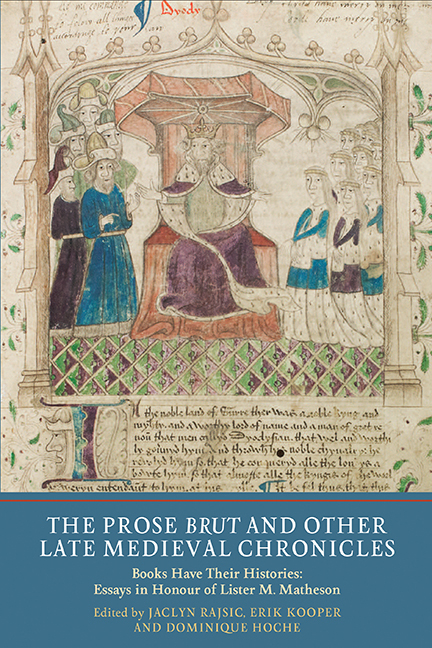 The Prose Brut and Other Late Medieval Chronicles
The Prose Brut and Other Late Medieval Chronicles Book contents
- Frontmatter
- Dedication
- Contents
- List of Plates
- List of Contributors
- Acknowledgements
- Curriculum Vitae of Lister M. Matheson
- Introduction
- A Memoir: The Whole Haggis: Lessons From the Work of Lister M. Matheson
- Part I Uses of History
- 1 Piety, Community and Local History: Le Livere de Reis de Engleterre and its Context in Cambridge, Trinity College, MS R.14.7
- 2 The Seen and the Unseen: Miracles, Marvels and Portents in the Middle English Chronicle of Nicholas Trevet
- 3 ‘And Many Oþer Diuerse Tokens …’: Portents and Wonders in ‘Warkworth's’ Chronicle
- 4 The Lawyer and the Herald
- Part II The Prose Brut
- Part III Receptions and Afterlives of Late Medieval Chronicles
- Index of Manuscripts Cited
- General Index
- Tabula in Memoriam
2 - The Seen and the Unseen: Miracles, Marvels and Portents in the Middle English Chronicle of Nicholas Trevet
from Part I - Uses of History
Published online by Cambridge University Press: 05 July 2016
- Frontmatter
- Dedication
- Contents
- List of Plates
- List of Contributors
- Acknowledgements
- Curriculum Vitae of Lister M. Matheson
- Introduction
- A Memoir: The Whole Haggis: Lessons From the Work of Lister M. Matheson
- Part I Uses of History
- 1 Piety, Community and Local History: Le Livere de Reis de Engleterre and its Context in Cambridge, Trinity College, MS R.14.7
- 2 The Seen and the Unseen: Miracles, Marvels and Portents in the Middle English Chronicle of Nicholas Trevet
- 3 ‘And Many Oþer Diuerse Tokens …’: Portents and Wonders in ‘Warkworth's’ Chronicle
- 4 The Lawyer and the Herald
- Part II The Prose Brut
- Part III Receptions and Afterlives of Late Medieval Chronicles
- Index of Manuscripts Cited
- General Index
- Tabula in Memoriam
Summary
AND in that same tyme whan thys Kyng Iohn of Ynglond entred into Yrelond, at a toune than in Hampshyre the whyche ys called Andeuer, was sleyn than with thonder a preeste abought mydnyght in the syght of all the pepull in the churche, and there was none other body hurte. And a grete hog was sent rennyng in the churche among all the pepull. (for year 1171)
And in the tyme of Lowes, the emperour abouesayde, Bristan, bysshop of Wynchestre was full famous, the whyche sayde masse euery day for all Cristen soules. And opon a tyme as he walked as his custom was in a churche yorde. And prayed for all Cristen soules. And whan he sayde Requiescant in pace, he herde answere to hym as hit had be a grete ooste of pepull oute of her tombes: Amen. (c. 931)
But than the chamburlayne, by the commaundement of hys lorde, caste ageyne the knyfe the whyche he toke in a full grete haste. And than the carbuncle recouered hys clerenesse. And the images returned ageyne echone into hys place. And than thys Gereberd, so called Syluester, wente home ageyne with hys chamburleyn by the same wey that they come, and brought ryght naught. And after when they were go oute, the ymage in the felde of Martius appered no more. And the erthe closed withoute any apperaunce where hit was opened. And the chamburleyne bare with hym but onely hys lanterne. And som folk seyen that thys meruayle was done by Merlyn. (c. 999)
When Nicholas Trevet's fourteenth-century Anglo-Norman universal chronicle, Les Cronicles, was translated into Middle English nearly a century after its composition, the anonymous fifteenth-century translator must have counted on an audience still as fascinated by stories of miracles and portents in world history as were Trevet's first readers. This later compiler appended to Trevet's work a version of the Prose Brut chronicle to continue the history from 1334 to c. 1417 – a narrative also containing accounts of extraordinary and wondrous events scattered among its historical reportage, but focusing on England.
- Type
- Chapter
- Information
- The Prose Brut and Other Late Medieval ChroniclesBooks have their Histories. Essays in Honour of Lister M. Matheson, pp. 30 - 48Publisher: Boydell & BrewerPrint publication year: 2016
